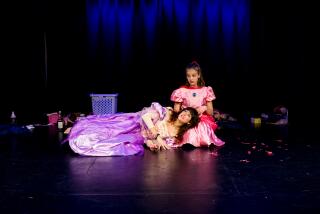Fringe Festival : THE FRINGE: MORE OF A MISS THAN A HIT : Jazz : No Names, No Bands, No Originality
- Share via
From the point of view of the jazz community, this most American of the arts was barely on the fringe of the Fringe Festival.
It was a tribute to Samuel Brown, the veteran teacher at Jefferson High School whose students included many celebrated jazz men, none of whom took part in the festival. In another venture, Harold Land, the tenor saxophonist, was set to lead a group at Cal Tech but exercised his option to withdraw in favor of another, longer booking. His place was taken by Harold Land Jr., his pianist son, leading a quintet with the trumpeter Oscar Brashear.
The fact is that not one world class name was hired; not one outstanding organized combo such as those of Wynton Marsalis, Art Blakey, Chick Corea, Phil Woods or any of the scores of others who could have represented the many phases of small group jazz today. Nor was there a solitary big band, nor any of the countless vocal luminaries who currently light up the scene. Not one composer was invited to write original music to be performed during the month of festivities.
This sort of Cinderella treatment was common in jazz three or four decades ago, but many of us were under the impression that the music had come out of the shadows. Evidently neither the festival director Aaron Paley nor anyone advising him was aware of this.
It would have been simple to go to one of the major record companies for advice, support and talent. Many of them would gladly have cooperated by making it possible for one of the dozens of groups on their labels to take part. Alternately, advice could have been sought from the Los Angeles Jazz Society, the National Academy of Jazz, the International Assn. of Jazz Appreciation, the Jazz Heritage Society and other such groups, all based locally and eager to advance the cause of the music.
Was jazz simply lost in the shuffle? Did the organizers of the Fringe events simply not know, or care, enough to investigate these avenues? Was the problem aggravated by economics?
The ultimate irony is that if a comparable arts festival were held in Japan or France or Sweden, jazz could be sure of substantial and appropriate representation. It is sad indeed to reflect that the days of the profit-without-honor syndrome are not yet over.
More to Read
The biggest entertainment stories
Get our big stories about Hollywood, film, television, music, arts, culture and more right in your inbox as soon as they publish.
You may occasionally receive promotional content from the Los Angeles Times.










